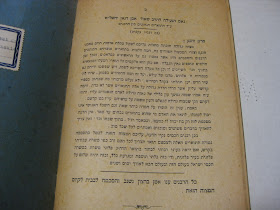 |
| A list of the attending Rabbis at the conference |
The conference in 1949 addressed many of the issues of the day, and this pamphlet listing the accepted regulations, is a great indication of how the Rabbis viewed their responsibility in adapting to the times.
R. Shaul Ibn Danan headed the conference, and here is a quote from some of his opening words:
"לא עלינו האשמה כי כל דברות קדשם של רבותינו זיע"א רצוים ומקובלים עלינו.... והאשם תלוי בזמן הנכחי התחלפות התקופה וכמאמר החכם יעשה הזמן מה שלא יעשה השכל ואין ספק שגם רבותינו לו היו בעת הזאת כי גם אז יגזרו אומר להחליף דבר לגרוע ולהוסיף עפ"י הוראת הזמן והמצב"
"It is not on us the blame, as all the words of our Rabbis are welcome and accepted upon us... the blame lies in the current time, the change of the winds, as the wise man said, time will do what the intellect will not. There is no doubt, that our great Rabbis, if they were in these times, they too will decree to add or remove decrees depending on the needs of the time"
 |
| The words of Ibn Danan |
1. Unmarried daughters inherit with their brothers after a death of a parent
The background being, that daughters were going to the Civil Courts in such cases and getting decisions in their favors, regardless of the Halakhic decision. The Rabbis realized that once the people started getting used to visiting the civil courts, they will go there for other issues as well and the Rabbinical courts will soon be obsolete. They found it better to make a decree, that appears to be against Biblical Law, in an effort to preserve the community.
2. Children of unmarried women who were adopted by strangers can not be removed from the adoptive family until they are reimburses for their expenses.
Background: Single women were giving birth out of wedlock, giving their children over to other people's care and reappearing years later and taking back their children. As a result, people were refraining from adopting such children, for fear it is just temporary and at a loss and these children were left homeless.
3. A unanimously agreed upon edict, to refrain from giving numerous honorary titles to Rabbis. Ibn Danan bemoans the fact that the later the generation the less value is given to these titles, and the numerous titles thrown around were making any such title of little value. This agreement ends with the statement:
כל הרבנים ענו אמן ברצון נשגב והסכמה לבבית לקיום המצוה הזאת
All the Rabbis answered Amen with lofty agreement and heartfelt acceptance to act upon this great Mitzvah
 |
| The edict to to refrain from giving numerous honorary titles to Rabbis |
As opposed to using the motto חדש אסור מן התורה the Rabbis went out of their way to bend the Torah, to a point where community will accept it willingly and have it adapt to the time, all within the frameworks of Halacha.


It's interesting to see how they felt the issue of superfluous honorary titles important enough to vote on it. I like the way he describes it as "unbearable to the human mind, to describe someone with such high praises"
ReplyDeleteHow much do u want for the book
ReplyDeleteHi,
Deletethe book has since sold
thank you for your interest
"This conference is a small indication of the great difference of approaches between North African Jewry and Eastern European's Jewry's and their reaction to the modernization of the world and the reforming movements.
ReplyDeleteAs opposed to using the motto חדש אסור מן התורה the Rabbis went out of their way to bend the Torah, to a point where community will accept it willingly and have it adapt to the time, all within the frameworks of Halacha."
Much too broad of generalization.
Also, חדש אסור מן התורה was something from the Chasam Sofer, and those who followed him, especially in Hungary. Which is Central or Western Europe. Eastern Europe was somewhat different.
I used חדש אסור מן התורה in the more general sense, in the approach it came to signify, that of refusing to change anything even practices that were not explicitly required by Halacha, as a method to combat reform. I think the Agudah in Poland and the very large portion of Eastern European's Jews Rabbinate believed that this would be the best method to combat the reformers. The Chatam Sofer may have coined the term, but the idea is not a new one, I think the Mitnagdim had in part the same reasons to oppose Hasidism.
DeleteIt is a broad generalization, I don't mean to prove it from this one case, but
the impression you get from the Responsa of Sephardic Rabbis of the last 2 centuries is of a very different approach to the problem. You can take R. Yosef Messas and R. Israel Moses Hazan's Responsa as extreme examples, and I would venture to say that R. Ovadia Yosef's Responsa follow the same tradition as well.